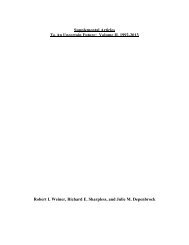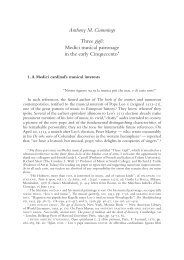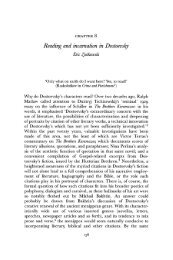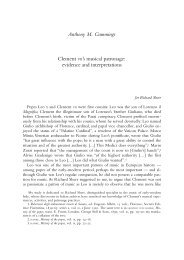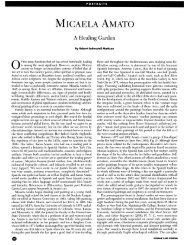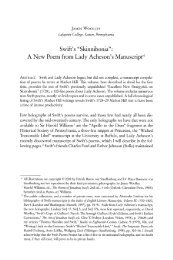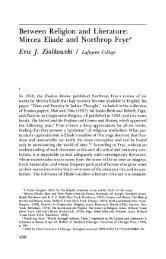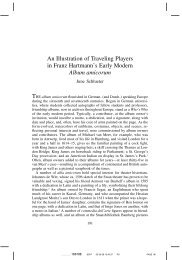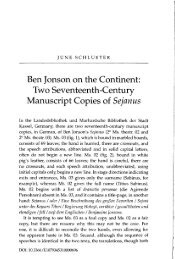courses of instruction - Lafayette College
courses of instruction - Lafayette College
courses of instruction - Lafayette College
Create successful ePaper yourself
Turn your PDF publications into a flip-book with our unique Google optimized e-Paper software.
GEOLOGY AND ENVIRONMENTAL SCIENCES<br />
215. Modern and Ancient Depositional<br />
Environments. Sedimentary deposits pro<br />
vide the majority <strong>of</strong> the water, energy, and<br />
mineral resources used by humans. This<br />
course explores the processes whereby sed<br />
iments are formed and accumulate in mod<br />
ern environments, as well as the pathways<br />
that convert loose sediments to solid rocks.<br />
Emphasis placed on determining environ<br />
mental conditions recorded in ancient sedi<br />
mentary rocks. Lecture/laboratory/re<br />
quired weekend field trips. Prerequisite:<br />
Any 100-level geology course or permis<br />
sion <strong>of</strong> instructor. Ms. Schubel<br />
224. Structure and Tectonics <strong>of</strong> the Earth.<br />
An examination <strong>of</strong> global tectonics and<br />
the response <strong>of</strong> rocks to stress at all scales,<br />
with an emphasis on an understanding <strong>of</strong><br />
the relationship <strong>of</strong> structural geology to<br />
tectonic theory. This includes a systematic<br />
study <strong>of</strong> folds, faults, joints, foliations, and<br />
lineations from which the geometric rela<br />
tionships and deformational history <strong>of</strong> the<br />
earth's crust can be deduced. Lecture/lab<br />
oratory/required weekend field trips.<br />
Prerequisite: Any 100-level geology<br />
course. [W] Mr, Malinconico<br />
300. Earth Surface Processes. Comprehen<br />
sive analysis <strong>of</strong> geological processes that pro<br />
duce, maintain, and change the earth's sur<br />
face. Topics include tectonics and landforms,<br />
rock weathering, soil development, hillslope<br />
processes, and river and glacial erosion and<br />
deposition. The subject is to explore through<br />
the systems approach where earth surface<br />
processes and landforms are viewed as inter<br />
acting components <strong>of</strong> a complex system. The<br />
operation <strong>of</strong> geomorphic systems is exam<br />
ined from a process-response perspective.<br />
Laboratory includes map and aerial photo<br />
analysis as well as field work and a field<br />
project. Lecture/laboratory. Prerequisite: Any<br />
100-level geology course. Geology 200 and<br />
224 are recommended. [W] Mr. Germanoski<br />
307. Igneous and Metamorphk Petrology.<br />
An examination <strong>of</strong> igneous and metamor-<br />
phic rocks as records <strong>of</strong> the crustal evolu<br />
tion <strong>of</strong> the earth. The origins and existence<br />
<strong>of</strong> these rocks are examined in view <strong>of</strong><br />
chemical phase equilibria and igneous and<br />
124<br />
metamorphic processes. Laboratory work<br />
emphasizes the identification and classifica<br />
tion <strong>of</strong> igneous and metamorphic rocks us<br />
ing hand samples, thin section identifica<br />
tion, X-ray powder diffraction, analytical<br />
techniques, and field relationships. Lec<br />
ture/laboratory. Prerequisite: Geology 200.<br />
Geology 224 is recommended. Mr. Hovis<br />
310. Advanced Environmental Geology.<br />
The course is divided into three segments:<br />
geo-hazards, land-use, and fossil fuel utili<br />
zation and carbon cycling. Geo-hazards<br />
focuses on assessing geologic hazards<br />
such as volcanic eruptions, earthquakes,<br />
and flooding. Land-use focuses on soil<br />
erosion, channel change related to land-use<br />
activity, strip mine reclamation, and acid<br />
mine drainage. Carbon cycling focuses on<br />
global warming and factors that must be<br />
considered in climate modeling, including<br />
analysis <strong>of</strong> natural variations in global cli<br />
mate and carbon cycling through geologic<br />
time. Lecture/laboratory. Prerequisite:<br />
Geology 110 or 120. Geology 300 recom<br />
mended. Mr. Germanoski<br />
311. River Form and Function. Examination<br />
<strong>of</strong> rivers and their effects on the landscape.<br />
The course explores such topics as drainage<br />
network development, sediment yield, sedi<br />
ment transport, river morphology, landscape<br />
elements produced by fluvial activity, and<br />
the interaction between humans and fluvial<br />
systems. The relationships between rivers<br />
and landscape evolution over the long term<br />
is a central issue, capped by a discussion <strong>of</strong><br />
the geomorphic evolution <strong>of</strong> the Appala<br />
chians and the concept <strong>of</strong> peneplanation.<br />
Prerequisite: Geology 300 or permission <strong>of</strong><br />
instructor. Mr. Germanoski<br />
320. Paleontology. Broad survey <strong>of</strong> the<br />
morphology <strong>of</strong> invertebrate fossil groups.<br />
Problems <strong>of</strong> identification and classification<br />
<strong>of</strong> extinct and living organisms. Emphasis<br />
on use <strong>of</strong> modern ecological principles for<br />
interpretation <strong>of</strong> past environments. Lec<br />
ture/laboratory. Prerequisite: Geology 130<br />
or permission <strong>of</strong> instructor. Staff<br />
321. Geochemistry. An introduction to the<br />
chemical and thermodynamic principles and



